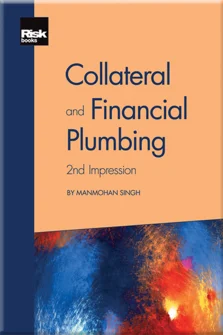When Financial Plumbing Breaks Down: An Example from Central Counterparties
Collateral in Financial Plumbing
Collateral Velocity
The Economics of Shadow Banking
Collateral and Monetary Policy
Money, Collateral and Safe Assets
Collateral and the OTC Derivatives Market
The Changing Collateral Space
The Collateral Infrastructures
The Sovereign–Bank Nexus via OTC Derivatives
When Financial Plumbing Breaks Down: An Example from Central Counterparties
Transmission of Monetary Policy Feds Lift-off and Collateral Reuse
Conclusion
Introduction
Banking and non-banking activities carried out by banks are often closely intertwined and legally difficult to disentangle, especially for systemically important banks (SIBs). Even though SIBs are normally classified as depository institutions, a significant portion of their exposures may be non-deposit-related in some instances over 90% (eg, Goldman Sachs, Morgan Stanley).11Such deposits are insured and are increased by sweeping excess client cash from broker-dealer accounts. When SIBs run into trouble and require government support, it will often be because of their non-banking activities. However, non-banks, such as hedge funds, asset managers, insurers, pension funds and central counterparties (CCPs), do not overlap with SIBs (see Figure 10.1). Thus, ex ante, there is little economic justification for the argument that those non-banks should receive taxpayer support, if taxpayer support is justified as protection of deposits.
At the same time, global regulators have already labelled some insurers as systemically important. CCPs have also garnered special status as financial market infrastructures (FMIs) or financial market utilities (FMUs), as they are termed in
Copyright Infopro Digital Limited. All rights reserved.
As outlined in our terms and conditions, https://www.infopro-digital.com/terms-and-conditions/subscriptions/ (point 2.4), printing is limited to a single copy.
If you would like to purchase additional rights please email info@risk.net
Copyright Infopro Digital Limited. All rights reserved.
You may share this content using our article tools. As outlined in our terms and conditions, https://www.infopro-digital.com/terms-and-conditions/subscriptions/ (clause 2.4), an Authorised User may only make one copy of the materials for their own personal use. You must also comply with the restrictions in clause 2.5.
If you would like to purchase additional rights please email info@risk.net











